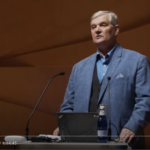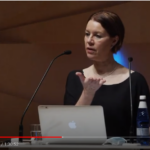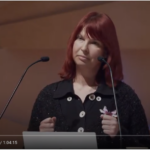Last week (January 19–22, 2021), a training and inspiration week “Evolving Academy” took place at the Academy of Music and Theatre, during which a number of lectures on various topics took place. There were three so-called big lectures held in the main hall:

Coach Raul Rebane: “From another angle. How to create your own story?”
The media is a technical tool for disseminating and building one’s own image. Fear of making mistakes prevents one from speaking, but with the right exercises and preparation methods, one can train and gain confidence for successful media communication. “Own story” is a system of values on which all business and communication is based.

Lecturer Päivi Arjas (Sibelius Academy): “Performance coaching for musicians – what it is and what it can be”
The presentation focused on the Sibelius Academy’s study program, which addresses mental and physical factors that affect performance, communication with the audience and working under stress, as well as techniques that either help to improve the skills and abilities arising from these factors or overcome certain limitations.

EAMT psychologist Elina Kivinukk: “Supporting a sense of security at work and in class”
Estonian Academy of Music and Theater stands for a safe and respectful learning and working environment. Last year, the Senate approved measures to ensure equal treatment and a complaints procedure that can help to address possible complaints in more detail. Topics of equal treatment, bullying and harassment were touched upon. Suggestions were made on how to support oneself and others’ sense of security in everyday communication, at work and during lessons.
In addition, trainings took place:
Senior Lecturer Maret Mursa Tormis: “Introduction to Alexander Technique” F.M. Alexander has said, “My technique is based on inhibition, the inhibition of undesirable, unwanted responses to stimuli, and hence it is primarily a technique for the development of the control of human reaction.” The ability to stop, to delay the reaction until we are adequately prepared to do so, Alexander calls inhibition. The aim of the short course was to introduce Alexander principle and its use in working with musicians.
Senior lecturer Heiki Mätlik: “Student’s GREAT study plan – soloist, member of an orchestra, pedagogue, early music or contemporary music interpreter?”, which focused on the questions: how to plan the final goal of one’s studies; where to arrive at the end of five years of academic study; how to orient the repertoire according to one’s field, choose the literature, etc.
EAMT psychologist Elina Kivinukk: “How to give and receive feedback (and not against your fingers)?” – how to give feedback during lessons, at the workplace or after the performance in a way that is useful and motivating? How to handle a situation where someone shares a criticism that you do not agree with? EAMT psychologist Elina Kivinukk offered ideas and examples on this topic, based on the research of Sheila Heen and Douglas Stone.
Prof. Lembit Orgse, Prof. Henry-David Varema, Prof. Peeter Sarapuu, Lecturer Eerik Jõks: “Observations and best practices in the implementation of e-learning” – experiences were shared in regards to the e-learning solutions for theoretical-practical subjects of interpretation pedagogy (professional didactics seminars, pedagogical practice, etc.), consequent changes in the content of subjects and in the forms of implementation; as well as the practical possibilities of distance learning and innovations in conducting speciality lessons – the opportunities during the period of pandemic to support students’ autonomy, etc.
Language editor Merit Lassmann: “Our everyday mother tongue” – everyday life requires, to a greater or lesser extent, from all of us to communicate in writing – in order to gain communication courage, we tried to solve the following questions: how to maintain good literacy after many years have passed since your last Estonian class; where to get help in case of language hesitations and doubts; how many language rules have changed, what we should know about these changes, and so on.





